Posted: March 9th, 2017 | 2 Comments »
I came across this plate in the front of a book the other day at The London Library in St James’s. However this plate is for the Royal Central Asian Society – a brief history of which is below. They had nice digs over at 8 Clarges Street, just off Piccadilly (though the original building is sadly gone and replaced by a rather nondescript modern office thing). The Royal Central Asian Society (originally, The Central Asian Society) became The Royal Society for Asian Affairs (RSAA) around 1975. I can only assume they handed their library over to be Incorporated within the London Library’s extensive collections.

The Central Asian Society was established in 1901. In November of that year, Dr Cotterell Tupp, Captain Francis Younghusband, Colonel Algernon Durand, and General Sir Thomas Gordon convened at Younghusband’s house in Gilbert Street, Grosvenor Square, London, to discuss the response to an informal prospectus they had circulated amongst friends during the previous month. They agreed that sufficient interest had been aroused and decided to formally distribute their prospectus for a new Society. The prospectus (“A Proposal to Establish a Central Asian Society”) began: “At present there is in London no society or institution which is devoted entirely to the consideration of Central Asian questions from their political as well as from their geographical, commercial or scientific aspect, though Societies such as the Royal Geographical and Royal Asiatic Society discuss these subjects incidentally. It is therefore proposed to establish a society to be called the Central Asian Society, with rooms, where those who either have travelled in Central Asia, or are interested in Central Asian questions, could meet one another.”
The “Central Asian questions” to which the Proposal referred derived from the political and diplomatic confrontation between Britain and Russia that continued throughout most of the nineteenth century. The confrontation was played-out in the Central Asian territories that lay between British India and Russia, and came to be known, after Kipling, as the “great game”. Many of the founding members and key figures of the Central Asian Society were active participants in the latter stages of this “game” of empires, as much of the material in the archive reflects.
On 1 January, 1975, the Society changed its name to The Royal Society for Asian Affairs, reflecting a shift of emphasis from narrowly Central Asian matters to an embrace of Asia as a whole. The shift of emphasis had already been marked (in 1970) by the renaming of the Society’s Journal as Asian Affairs. Formerly, Journal of the Royal Central Asian Society, the Society’s Journal has been published continuously since 1914. The present remit of the RSAA is the contemporary economic, political and social developments of every Asian country.
Posted: March 8th, 2017 | No Comments »
This picture was taken in 1936 by the well-known American China correspondent Laselle Gilman. He claimed she was a cabaret dancer and taxi-dancer in a Peking (or Peiping in 1936) cabaret – sadly he didn’t record her name or the establishment she worked in…
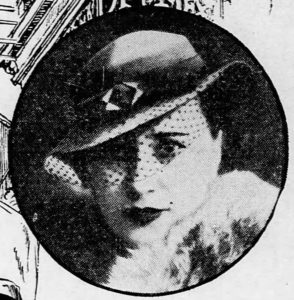
Posted: March 7th, 2017 | No Comments »
Jade was a massive business for the tourist and sojourner trade. Foreigners developed what Harold Acton term ‘collecting mania’ in China (in those days curios were abundant and exchange rates very favourable, though a fair bit of fake was floating around too then as now). Jade was top of the list….and so the Jade Store, craftily named the Jade Headquarters and perfectly situated on Nanking Road, opposite the Palace Hotel (now the Swatch Art Peace something or other Hotel). It also ran ads with the strap line, “The Most Interesting Store in Shanghai” in the 1920s. As with seemingly every curio store, they moved premises over the years, though always on Nanking Road (12A for a while, then 24, then in the late 30’s they moved to no.80 having been blown out by the bombs on Nanking Road in August 1937). The store’s hong name, by the way, was Fon Kong Kung Sze and, as well as obviously jade, they sold silverware and porcelain objets.
To drum up trade they also published a guide – What Everyone Should Know About Jade (January, 1939), by Bolton Lee and with a foreword by the esteemed Arthur de Carle Sowerby of the Royal Asiatic Society and the China Journal in Shanghai. Just $1 Mex. Apologies, but I know nothing about Bolton Lee.
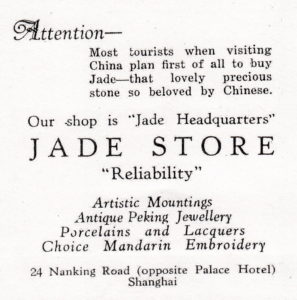
Posted: March 6th, 2017 | 1 Comment »
Book launch and lecture: Edward Denison, ‘Ultra-Modernism – Architecture and Modernity in Manchuria’
Ultra-Modernism – Architecture and Modernity in Manchuria
Authors: Edward Denison and Guangyu Ren
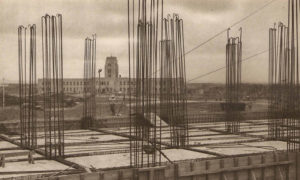
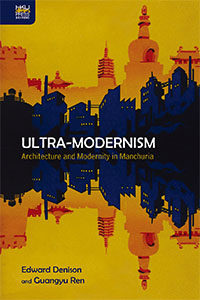
Join Dr Edward Denison, lecturer at The Bartlett School of Architecture, UCL, and Guangyu Ren for a discussion and launch of their latest book, Ultra-Modernism – Architecture and Modernity in Manchuria. The book is not only the first international publication to investigate this important but overlooked architectural history, but is also an attempt to question the very master narrative of architectural historiography that continues to prejudice western experiences over others.
This is a free event. Please reserve your place on the Eventbrite website.
About the book
History is a record of power. The writing of history is a privilege of life’s winners – one which is denied to its losers. The modernist canon bears exceptional testimony to this inequity. Constructed throughout the twentieth century – modernism’s century – it privileged western ideas, methods and territories while suppressing others. For architecture, the consequence is a world constructed in the west’s image and constricted by its gaze. Manchuria – the north-eastern region of China formerly occupied by Japan – epitomises this partiality. In an Anthropocenic epoch in which our knowledge of the built environment and its history is necessarily planetary, this partiality exposes the canon’s deficiency.
Japan was the first non-western nation to fully embrace modernisation and, like many western nations before it, it enlisted empire. Defeating China and Russia, and outmanoeuvring the western powers, Japan’s occupation of Manchuria from 1905–1945 precipitated unprecedented investment in city planning and architecture. So significant was the scale and scope of this encounter, Japan called it Ultra-Modernism – a term deliberately distinguishing it from western precedents.
In 1932, Japan formally created the new state of Manchukuo, but imperial dreams swiftly turned into a nightmare and global conflict. The dropping of atomic bombs on Hiroshima and Nagasaki not only brought an end to Manchukuo, but marked the dawning of an entirely new age – the Anthropocene – in which humankind’s impact on the world became global, including our capacity to not only create entire modern cities, but also to destroy them in an instant. Ultra-Modernism – Architecture and Modernity in Manchuria is an attempt not merely to narrate one overlooked history, but to question the master narrative.
more details here
Posted: March 5th, 2017 | 2 Comments »
Wonderful news that the good folk at Earnshaw Books have republished (and annotated no less) Norwood F. Allman’s classic Shanghai Lawyer….out in e-book format now and, in mid-April, in paperback…..
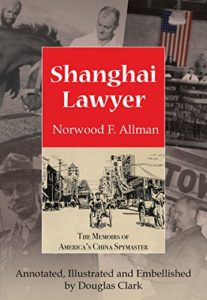
Diplomat, lawyer, judge, soldier, spy, spymaster; just some of the positions American Norwood Allman, held in his 30 plus years in China. Shanghai Lawyer is Allman’s first-hand account of his amazing life, from his arrival as a student interpreter during WWI, to serving as a Chinese and Mexican judge, practising before the U.S. Court for China, commanding the American militia in Shanghai, and, finally fighting the Japanese army in the battle for Hong Kong in 1941. Douglas Clark, author of Gunboat Justice, has trawled through public, private and personal archives to bring the story Allman tells in his acclaimed bestseller fully back to life.
Posted: March 4th, 2017 | No Comments »
I’ve been reading Lyndsy Spence’s The Mistress of Mayfair: Men, Money and the Marriage of Doris Delevingne, who may be better known to many as Doris Castlerosse. She was considered one of London’s most beautiful women in the 1920s and 1930s, as well as one of the city’s most sexually liberated.
Anyway, in 1936 Doris took a tour of the Orient – Java, Bali, Singapore, the Philippines, Malay States, Sri Lanka, China (where she certainly popped into Peking) and Japan – departing for home from Hong Kong. Now many of us have departed Hong Kong for London and bumped into the odd interesting person but Doris’s ship home had a great cast:
- William Rootes – luxury car maker and, at the time, engaged in an affair with Doris
- Geoffrey Rootes – his son and who was accompanied by a ‘nymphomaniac’ friend of Doris’s to keep him occupied
- Hon. Mrs Hubert Parker – born Loryn Bowser of Kentucky before marrying Hubert Lister Parker, Baron Parker of Waddington and a leading barrister
- Charlie Chaplin and Paulette Goddard – the film stars obviously
- Jean Cocteau – the French writer, designer, artist, filmmaker, opium addict etc etc
Beat that next time you’re in line at Chek Lap Kok and scanning your fellow passengers….
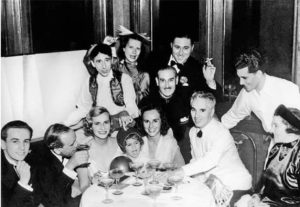
Posted: March 3rd, 2017 | 2 Comments »
Yesterday I noted the forthcoming Royal Asiatic Society’s visit to the former Lunghua Internment Camp in Shanghai. I should mention the new book that inspired that trip….Ruth’s Record: The Diary of an American in Japanese-Occupied Shanghai 1941-1945 by Ruth Barr…
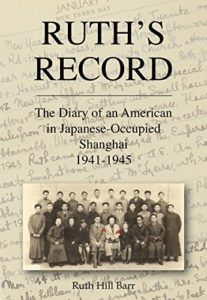
The year 1941 was a turning point for the world, but long-time Shanghai resident Ruth Hill Barr had no way of knowing that when she started her five-year diary on January 1st. Before the year was over, the Japanese Army had occupied Shanghai’s International Settlement, and she and her family were stranded as enemy aliens, soon to be placed in a Japanese internment camp. This book includes the full text of Ruth’s diary along with explanations and memories by her daughter Betty, revealing with fascinating detail the anguish and, incredibly, the continuity of life inside and outside the Shanghai camps during the war.
Posted: March 2nd, 2017 | No Comments »
As part of the University of Westminster’s current Difference Festival the Regent Street Cinema is screening the 1919 film Broken Blossoms this Friday (3/3/17) at 5.30pm – admission is free and you get an introduction by Dr Anne Witchard (Thomas Burke’s Dark Chinoiserie and Lao She in London) and organ accompaniment by Donald Mackenzie. If you haven’t seen the film (directed by DW Griffith and starring Lillian Gish and Richard Bathelmess) you should – if for nothing else than it is an adaptation of one of Thomas Burke’s Limehouse Nights stories. Also, if you have visited the marvelously restored Regent Street Cinema this is a golden opportunity…booking (though it’s free) is here…

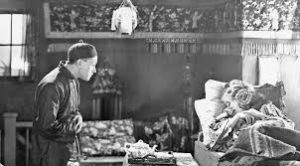

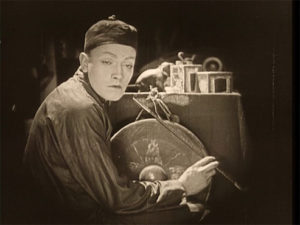
Cheng Huan is a missionary whose goal is to bring the teachings of peace by Buddha to the civilized Anglo-Saxons. Upon landing in England, he is quickly disillusioned by the intolerance and apathy of the country. He becomes a storekeeper of a small shop. Out his window, he sees the young Lucy Burrows. She is regularly beaten by her prizefighter father, underfed and wears ragged clothes. Even in this deplorable condition, Cheng can see that she is a priceless beauty and he falls in love with her from afar. On the day that she passes out in front of his store, he takes her in and cares for her. With nothing but love in his heart, he dresses her in silks and provides food for her. Still weak, she stays in his shop that night and all that Cheng does is watch over her. The peace and happiness that he sees last only until Battling Burrows finds out that his daughter is with a foreigner.











